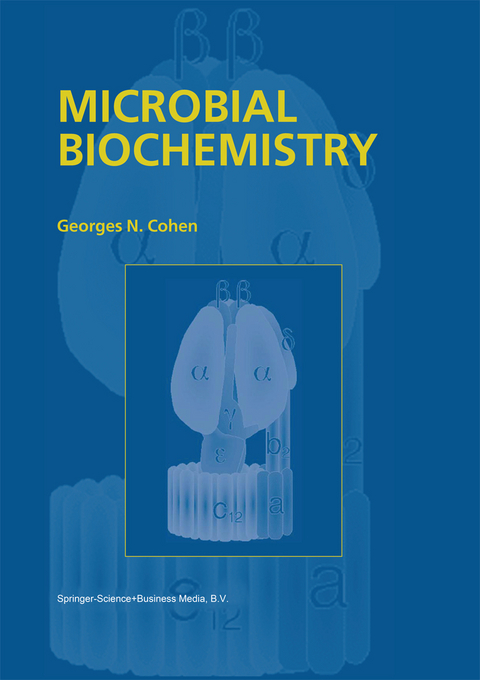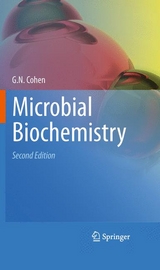
Microbial Biochemistry
Springer (Verlag)
978-90-481-6390-8 (ISBN)
- Titel erscheint in neuer Auflage
- Artikel merken
In the first section, the principles of bacterial growth are given, as well as the description of the different layers that enclose the bacterial cytoplasm, and their role in obtaining nutrients from the outside media through different permeability mechanism described in detail. A chapter is devoted to allostery and is indispensable for the comprehension of many regulatory mechanisms described throughout the book.
Another section analyses the mechanisms by which cells obtain the energy necessary for their growth, glycolysis, the pentose phosphate pathway, the tricarboxylic and the anaplerotic cycles. Two chapters are devoted to classes of microorganisms rarely dealt with in textbooks, namely the Archaea, mainly the methanogenic bacteria, and the methylotrophs. Eight chapters describe the principles of the regulations at the transcriptional level, with the necessary knowledge of the machineries of transcription and translation.
The next fifteen chapters deal with the biosynthesis of the cell building blocks, amino acids, purine and pyrimidine nucleotides and deoxynucleotides, water-soluble vitamins and coenzymes, isoprene and tetrapyrrole derivatives and vitamin B12.
The two last chapters are devoted to the study of protein-DNA interactions and to the evolution of biosynthetic pathways. The considerable advances made in the last thirty years in the field by the introduction of gene cloning and sequencing and by the exponential development of physical methods such as X-ray crystallography or nuclear magnetic resonance have helped presenting metabolism under a multidisciplinary attractive angle.
The level of readership presupposes some knowledge of chemistry and genetics at the undergraduate level. The target group is graduate students, researchers in Academia and industry.
I. Bacterial growth.- II. The outer membrane of Gramnegative bacteria and the cytoplasmic membrane.- III. Peptidoglycan synthesis.- IV. Cellular permeability.- V. Allosteric enzymes.- VI. Glycolysis, gluconeogenesis and glycogen synthesis.- VII. The pentose phosphate and Entner-Doudoroff pathways.- VIII. The tricarboxylic acid cycle and the glyoxylate bypass.- IX. Biosynthesis of lipids.- X. The Archaea.- XI. Methanogens and methylotrophs.- XII. Enzyme induction in catabolic systems.- XIII. Transcription. RNA polymerase.- XIV. Negative regulation.- XV. Enzyme repression in anabolic pathways.- XVI. Positive regulation.- XVII. The ribosomes.- XVIII. The genetic code, the transfer RNAs and the aminoacyl-tRNA-synthetases.- XIX. Attenuation.- XX. The biological fixation of nitrogen.- XXI. How biosynthetic pathways have been established.- XXII. The aspartic acid family of amino acids. Biosynthesis.- XXIII. Regulation of the biosynthe sis of the amino acids of the aspartic acid family in Enterobacteriaceae.- XXIV. Other patterns of regulation of the synthesis of amino acids of the aspartate family.- XXV. Biosynthesis of the amino acids of the glutamic acid family and its regulation.- XXVI. Biosynthesis of amino acids derived from phosphoglyceric acid and pyruvic acid.- XXVII. Selenocysteine and selenoproteins.- XXVIII. Biosynthesis of aromatic amino acids and its regulation.- XXIX. The biosynthesis of histidine and its regulation.- XXX. The biosynthesis of nucleotides.- XXXI. The biosynthesis of deoxyribonucleotides.- XXXII. Biosynthesis of some watersoluble vitamins and of their coenzyme forms.- XXXIII. Biosynthesis of carotene, vitamin A, sterols, ubiquinones and menaquinones.- XXXIV. Biosynthesis of the tetrapyrrole ring system.- XXXV. Biosynthesis of cobalamins including vitamin B12.- XXXVI. Interactions between proteins and DNA.- XXXVII. Evolution of biosynthetic pathways.- Abbreviations.
| Erscheint lt. Verlag | 1.12.2010 |
|---|---|
| Zusatzinfo | 18 Illustrations, black and white; XV, 333 p. 18 illus. |
| Verlagsort | Dordrecht |
| Sprache | englisch |
| Maße | 210 x 297 mm |
| Themenwelt | Mathematik / Informatik ► Informatik ► Theorie / Studium |
| Medizin / Pharmazie ► Medizinische Fachgebiete ► Mikrobiologie / Infektologie / Reisemedizin | |
| Studium ► 1. Studienabschnitt (Vorklinik) ► Physiologie | |
| Naturwissenschaften ► Biologie ► Biochemie | |
| Naturwissenschaften ► Biologie ► Mikrobiologie / Immunologie | |
| Naturwissenschaften ► Biologie ► Zellbiologie | |
| Naturwissenschaften ► Geowissenschaften ► Mineralogie / Paläontologie | |
| Naturwissenschaften ► Physik / Astronomie ► Festkörperphysik | |
| Technik | |
| ISBN-10 | 90-481-6390-0 / 9048163900 |
| ISBN-13 | 978-90-481-6390-8 / 9789048163908 |
| Zustand | Neuware |
| Haben Sie eine Frage zum Produkt? |
aus dem Bereich



